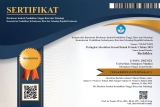Diversi Terhadap Recidive Anak
Abstract
Abstract
Since the date of July 30, 2014 the Law No. 11 of 2012. One of the things that set new Law No. 11 of 2012 is Diversio. In the implementation, although Diversion is intended to protect children from stigmatization and pressure of the judicial process, but has not been fully implemented because of the Law No. 11 of 2012 are the terms and conditions of the diversion that one of them is the child who did the crime of repetition is not allowed to finish through the process of Diversion. Child in conflict with the law that could damage the system community, especially people of Indonesia and due to the mischief, a child has to deal with the law and go to prison children. Therefore, implementation of the concept of diversion is done with the intention to avoid children from the negative implications of the criminal justice system that is, avoiding the child will enter the criminal justice system and eliminate child labeled criminals against children who have already become victims
Keywords
Full Text:
PDFReferences
Buku :
Apong, Helina,.Perlindungan Anak Berdasarkan Undang – Undang No 23 Tahun 2002 tentang Perlindungan Anak, Jakarta, UNICEF, 2003
Atmasasmita, Romli, Teori dan Kapita Selekta Kriminologi, PT. Refika Aditama, Bandung, 2010.
Darwan Prinst. Hukum Anak Indonesia. cet, 2. Bandung: PT.Citra Aditya Bakti, 2003.
Dewi, DS dan Fatahilla A.Syukur, Mediasi Penal : Penerapan Restorative Justice Di Pengadilan Anak Indonesia,Indie Pre Publishing, Depok, 2011.
Hadisuprapto, Paulus, “Juvenile Delinquency”, PT.Citra Aditya Bakti, Bandung, 1997
Kelana, Momo, Memahami Undang-undang Kepolisian (Undang-undang Nomor 23
Tahun 2002), Latar Belakang dan Komentar Pasal demi Pasal, PTIK Press, Jakarta, 2002.
Koeswadji, Hermien Hadiati,”Perkembangan Macam-macam Pidana dalam Rangka Pembangunan Hukum Pidana”, PT. Citra Aditya Bakti, Bandung, 1995.
Marpaung, Leden, Proses Penanganan Perkara Pidana, Cet II, Sinar Grafika, Jakarta, 2010.
Muladi dan Barda Nawawi Arief,” Bunga Rampai Hukum Pidana”,Penerbit Alumni, Bandung, 1992
Priyatno, Dwidja, “Sistem Pelaksanaan Pidana Penjara di Indonesia”, PT.Refika Aditama,Bandung,2006.
Soetodjo, Wagiati, “Hukum Pidana Anak”, PT.Refika Aditama,Bandung,2006.
Waluyo, Bambang,” Pidana dan Pemidanaan “, Sinar Grafika,Jakarta,2008
Jurnal :
Ance, Meldy Almendo, Prinsip Keadilan Dalam Tanggung Jawab Negara Terhadap Korban Tindak Pidana Karena Pelaku Tidak Menjalani Pemidanaan, Jurnal ilmu hukum, Universitas Airlangga, Vol. 31, April 2016.
Dyana C. Jatnika, Nandang Mulyana, dan Santoso Tri Raharjo, Residivis Anak Sebagai Akibat Dari Rendahnya Kesiapan Anak Didik lembaga Pemasyarakatan dalam Menghadapi Proses Integrasi ke Dalam Masyarakat, Jurnal Hukum UNPAD Vol 5 No 1, 2015
Greg Mantle, Restorative Justice and The Three Individual of Crimes,
International Journal of Criminology, 2005.
Karim, Tanggung Jawab Pelaku Pidana Pelanggaran Dalam Perspektif Restorative Justice, Jurnal Ilmu Hukum, Universitas Airlangga, Volume 31 No 3, September 2016.
Perdana Eliakhim Manalu, Suhaidi, Hamdan, Hasim Purba, Sanksi Pidana Terhadap Pelaku Tindak Pidana Perdagangan Orang, USU Law Jurnal Volume . 2 No. 3, 2014
Rusli Muhammad, Reformasi Sistem Pemasyarakatan, Jurnal Hukum Ius Quia Iustum, No. 1 Volume 6, Yogyakarta, 1999
DOI: https://doi.org/10.21107/ri.v12i2.3244
Refbacks
- There are currently no refbacks.

Rechtidee is licensed under a Creative Commons Attribution-ShareAlike 4.0 International License.
Indexing and Abstracting:












